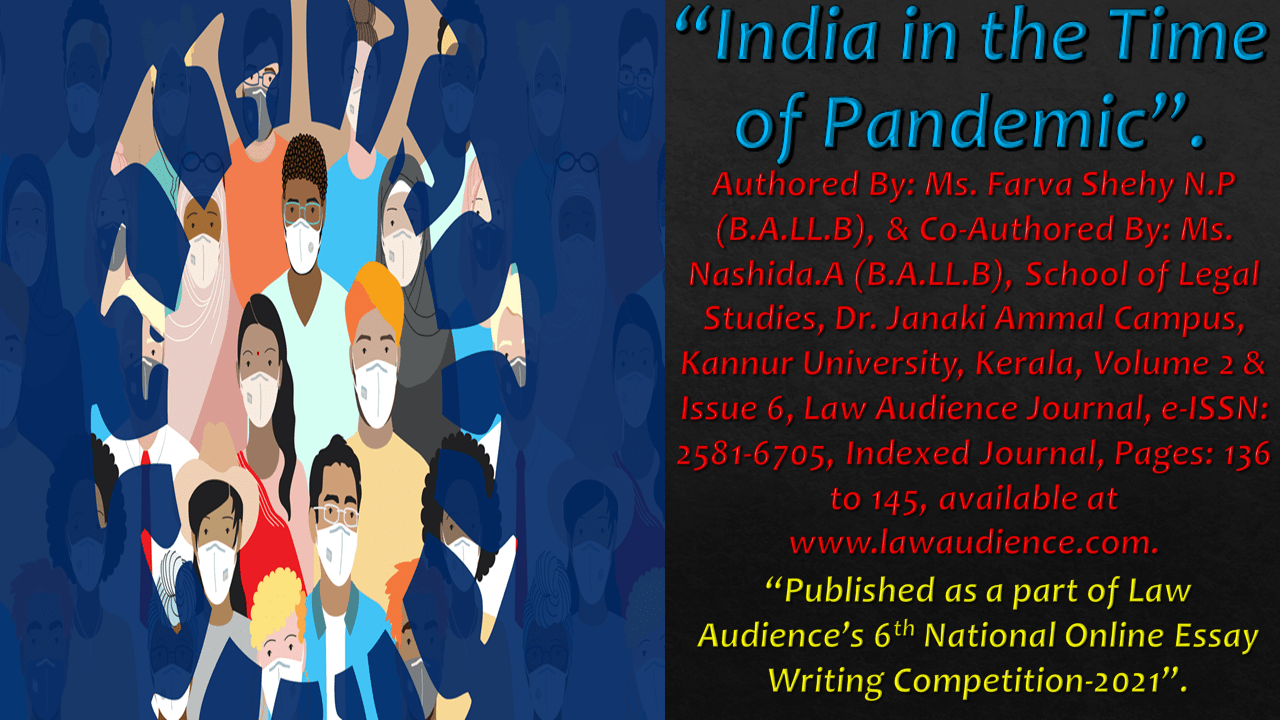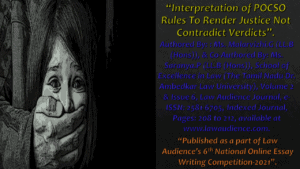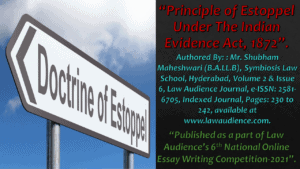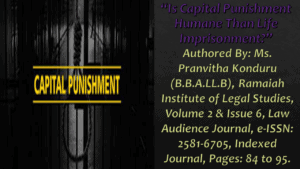Click here to download the full paper (PDF)
Authored By: Ms. Farva Shehy N.P (B.A.LL.B), & Co-Authored By: Ms. Nashida.A (B.A.LL.B), School of Legal Studies, Dr. Janaki Ammal Campus, Kannur University, Kerala,
Click here for Copyright Policy.
I. INTRODUCTION:
India is battling with coronavirus since January 2020. In 2021 India is battling with the second wave. The number of persons who were testing positive for coronavirus is also increasing at an alarming rate in the second wave of deadly pandemic in India. In the first wave of the coronavirus, to some extent Government can slow down the spread of coronavirus by imposing restrictions like lockdowns, night curfews etc. A similar kind of strategy is adopting by the Government in its second wave, but there is slight difference, in the case of first wave a nationwide lockdown is declared in India, but in the case of second wave governments mainly focus on the worst affected areas and consider it as a micro containment zone and implement restrictions there.
Moreover, lockdown creates many bad impacts like a dip in economic growth, dip in GDP, lockdown also produce bad impact on the lives of middle classes and migrant workers. But now the situation is going out of control in India and India becomes the first country in the world which records more than four lakh cases in a single day, Supreme Court in its Suo Moto action makes a recommendation to the central and State Governments to consider lockdown to curb the spread of the virus. At the beginning of second wave of coronavirus State Governments and our Prime Minister declares that lockdown may only be declared as a last resort to curb the spread of virus many state Governments realised that highly virulent strain of coronavirus in second wave cannot be made control without declaring a lockdown and many States Government declares lockdown as a last resort to curb the spread of virus.
The major problem faced by India during the second wave of coronavirus is that long queues of ambulance in front of cemeteries, lack of oxygen, lack of Remdesivir; an anti-viral drug, scarcity of vaccines etc. Government in the country has sole duty to protect the rights of individuals in their country even in the time of deadly pandemic so government should consider the rights of individuals in their country while imposing restrictions to curb the spread of pandemic while availing the medical facilities government should make confirm that there is no violation of basic rights of individual.
Government impose many restrictions and also avail many medical facilities and also implement many activities to curb the spread of coronavirus, whenever there arises any arbitrary action or whenever government fails to deliver their duty court will definitely interfere in the matter, this also happens in the case of covid situation in our country, court interferes in the matters related to lockdown, wearing of mask, burial of covid 19 victim, supply of oxygen and medicine and in the matters related to testing of coronavirus and vaccination.
II. LOCKDOWN:
As we all know lockdown is the strategy adopted by many of the countries to curb the spread of covid-19. Italy is the first country which declares lockdown to curb the spread of virus. Our country India also adopted similar kind of strategy to curb the spread of virus. Our Prime Minister Narendra Modi declares nationwide 21-day lockdown to flatten the curve of the spread of virus in March 2020, But the lockdown does not produce the desired result, it does not bring the cases down. Moreover, lockdown badly affects the livelihood of middle-class people and it also creates panic among the migrant labourers and they started to migrate to their own land from their workplace by walking because there is no transport facility is available due to lockdown. Many migrant labourers loss their live during their journey to their own land due to non-availability of food and water and also due to accidents.
The many States in our country are in lockdown because states cannot control the spread of the highly virulent strain of coronavirus through the restrictions in micro containment zone, due to this fact many states declare lockdown as a last resort to curb the spread of virus. Government also implements night curfews to make corona under control. Night curfews is popularly known as corona curfew. In night curfew government mainly restricts the movement of people during night time. Many governments across the country implement night Curfews to curb the spread of virus.
“In a PIL filed against UP Government in Allahabad High Court, court severely criticises the pathetic covid condition in the state and impose lockdown in some cities of UP till April 26 2021, this view was held by the court on 19th April 2021 by saying that those in the Helm Governance Are to Be Blamed for Present Chaotic Health Problems”:[1] Allahabad HC but the Government of UP challenge the order of Allahabad High Court in Supreme court and Supreme Court stayed the order of Allahabad High court by saying that it is not the right approach.
III. WEARING OF MASK:
To check the spread of COVID-19, many states and districts have issued guidelines for mandating the use of masks in public spaces under the National Disaster Management Act. Violating such guidelines is penalized under Section 188 of the Indian Penal Code, which deals with disobedience to order duly promulgated by a public servant. Masks and Sanitiser become the way of life by the arrival of covid-19.
Delhi High Court recently dismisses the petition challenging the imposition of fine by Delhi Government for not wearing mask while travelling alone in a private vehicle. Single judge bench of justice Prathiba M Singh, held that “mask is like a “suraksha kavach” it protects the person those who wear it and those around, court also added that “a private vehicle moving in public place even if occupied by a single person is consider as public place for the purpose of covid 19 control”[2].
Delhi High Court holds this view while they were making decision on four petitions filed by different lawyers challenging the imposition of challan for not wearing a mask while driving a private vehicle alone (Rakesh Malhotra vs. Government of National Capital Territory Delhi, (W.P.(C)3031/2020)), the court further adds that being advocates/lawyers ought to recognise and assist in implementation of measures to contain the pandemic, rather than questioning the same. Advocates as a class, owing to their legal training have a higher duty to show compliance especially in extenuating circumstances such as the pandemic.
“Wearing of masks cannot be made an ego issue. Compliance by advocates and lawyers would encourage the general public to show greater inclination to comply. The duty of advocates and lawyers is of a greater magnitude, especially in the context of the pandemic for enforcement of directives, measures and guidelines issued under the Epidemic Diseases Act, 1897 and the Disaster Management Act, 2005″.
IV. DIGNIFIED BURIAL OF COVID 19 DECEASED:
Nowadays India is witnessing a rapid surge in the COVID-19 fatality rate. In such a circumstance the burial of victims also becomes a problem. We can see a long queue of ambulance in front of cemeteries. Many cemeteries across the country functions for 24 hours because of increase in the number of dead bodies. Incident of mishandling the dead bodies coming up with families either keeping the infected dead bodies at home to pay the last respect or refusing to accept the dead bodies.
Recently Calcutta High Court ruled that “right to decent burial can be traced under article 25 and article 21 of the Constitution and court gives permission to the immediate family members of the Covid 19 victim to perform the funeral rights of the deceased subject to them following certain precautionary guidelines to eliminate or reduce the risk of them becoming infected by the deadly virus”[3]. In Common Cause (a registered society) vs. Union of India[4], Supreme Court held that right to die with dignity is a fundamental right under article 21 of the Constitution.
In Pradeep Gandhi vs. state of Maharashtra[5], the petitioner sought a stay on the burial of covid 19 infected dead bodies near his residential area, the court rejects the petition and uphold the rights of the dead person on the ground that it didn’t see a reason to why the dead be deprived of his/ her last rites. In a case court opined that, the scope and ambit of article 21 includes the right of decent burial of a dead body.
In Gulab Chandra Prajapathi vs. Chief Secretary, State of Jharkhand[6], Court directs the State Government to implement the “dead body management guidelines” for the disposal of the covid 19 infected bodies.
V. SUPPLY OF OXYGEN AND MEDICINE:
Drop-in oxygen level in coronavirus patient mainly leads to the death of covid victims. One of the major problems faced by India in the second wave of coronavirus is the shortage of oxygen, many patients surrender to covid 19 infection due to the drop in oxygen level. Kerala is the only state having surplus oxygen production in India. The National Capital Territory also facing the shortage of oxygen. Court also interferes in this matter also and strongly criticises the concerned authorities for not preparing for facing the second wave, because second wave of coronavirus is witnessed by countries like Britain, France, America etc, so the Government has the knowledge that second wave may also come in India, but doesn’t make sufficient facilities for facing the second wave of covid 19. One of the important anti-viral drugs that is used to treat covid 19 patient is Remdesivir, our country also faces the shortage of this anti viral drug and also ban the export of this anti-viral drug.
“State inaction in providing health care to citizens violates article 21 of the Constitution”, this view was held by Patna High Court and directs human rights commission to make surprise visit in covid care centres. This view was held by the court in the case of Shivani Kaushik vs. Union of India and others (Case no.353 of 2021).
In the beginning, Central Government doesn’t prohibit the use of Oxygen for industrial purposes, while the country is facing oxygen crisis in its battle with Pandemic, when the judiciary inquired about the centre’s this kind of approach, Centre informs the court that they will ban the industrial use of oxygen by April 22nd, this view was strongly criticised by the court it goes to the extent of saying that “People need Oxygen now why should wait for April 22nd to ban the use of oxygen for industrial purposes”[7], this view was held by the Delhi High Court. “Citizen can only fall back on the State. So, you have to beg, borrow or steal and ensure the protection of fundamental emergency”[8], remarked Justice Vipin Sanghi of Delhi High Court while hearing an urgent plea regarding the immediate need for oxygen at Max Hospitals in the Delhi NCR Region. The Delhi High Court also held that in case supply of Medical Oxygen to Delhi is blocked, then the local authorities responsible for its movement shall be held criminally liable for the same.
VI. SUPPLY OF VACCINES AND COVID TEST RESULTS:
Covshield and Covaxin are the two vaccines used by India to fight against Covid 19. India also gave approval for the use of Sputnik V on 13th April 2021. India starts its vaccination drive on 16th January 2021. During the first phase there is no shortage of vaccine. During the second phase of vaccination India also starts to face the shortage of vaccines also. There are many cases that came before the Court regarding the vaccine supply. From the third phase of vaccination drive Central Government decides to impose charges on vaccines, this creates huge protest among the people and many states government request for the change in the decision of central government with regard to the imposition of charges on vaccines for the people aged between 18 – 44.
“The Supreme Court raised serious questions at the Centre’s COVID vaccination policy which allows differential pricing between Centre and States and allows private companies to set the prices. The Court also asked why the Centre was not considering powers of compulsory licensing under the Patents Act over COVID vaccines”.[9] “An application has been filed before Supreme Court in the SuoMoto matter pertaining to the COVID-19 crisis in the country seeking directions to scale up the production of vaccines against Coronavirus as well as to ensure that the full course of vaccines is available free of charge at all Government hospitals and centres”.[10]
Testing and tracing are the two important weapons i.e., used to fight against the Pandemic. The fastest delivery of test result plays an important role in treating patients and also to curb the spread of virus. “Nagpur bench of Bombay High Court recently held that RT-PCR test result should be given to the patients immediately through WhatsApp and hard copies without waiting for them to be uploaded in the ICMR’s website and the court also urged that if these directions are not complied by the laboratories, then the concerned authorities have the right to take action against those disobeys the order of the court”.[11]
VII. CORONAVIRUS AND FUNDAMENTAL RIGHTS:
Due to the public health emergency, the nation has put limitations on the fundamental rights of the citizens to ensure public safety. To control the widespread of this contagious disease the nation had to put restraints over the citizens under Article 19(5) i.e; general public interest. At the initial stages of the lockdown imposed by the government the people were forced to sit in the confines of the shelter which led to drastic effects on the right to livelihood as citizens were suffering financially which ultimately led to the right to have a dignified life as several people lost their shelters and a crucial crisis in food availability had been seen by the nation.
In Delhi Rozi Roti Adhikar Abhiyan vs. Union of India & ors[12], challenged making of Adhaar card mandatory for receiving food kits, as this made it difficult to fulfil the needs of tourists as well as citizens. Even though complete lockdown was enacted this case held that ration shops to be opened seven days a week.
Now seeing that all the steps are taken to ensure the safety of the citizens health from a contagious disease the Government have failed to see that imposing lockdown has also affected with the citizens right to health as people are not able to approach hospital as needed. In Kerala 70-year-old women was reported dead as she was denied going to hospital in Mangalore, she was from Kunjathur (Kerala) a place where hospitals in Mangalore was nearer than other hospitals in Kerala but due to lockdown restriction as well as closing of Kerala Karnataka border, she was denied access to across Karnataka border.
The right to movement is a right which is not only supported by Indian law but also international treaties such as Universal Declaration of Human Rights and International Covenant on Civil and Political Rights (ICCPR). These treaties ensure that every person has the right to leave and return to any country including their native nation. It also ensures that any person gas the right to move freely in their own country. Though this is not an absolute right and can be retrained during the time of emergencies but this have entwined with a person’s day to day life. In India, several migrant workers were forced to walk miles to return back to their states by foot even though the Government arranged buses for inter-state workers to travel by but they were so short on money they even didn’t have proper meals a day. Later the Government arranged trains for them to travel by understanding it was easier and more effective.
In Alakh Alok Srivastava vs. Union of India [Writ Petition (Civil) No. 468 of 2020], Supreme Court held that the migrant workers to stop mass migration and for them to be transferred to relief camps or shelters in different districts.
VIII. THE EPIDEMIC ACT, 1897:
This Act was enacted by the British Government more than 120 years back. Still, this Act was summoned at the time of covid 19 spread even though the Act only contained four sections in total. Section 2 of this act enabled the Government to provide special provisions for regulations to be imposed at the time of any hazardous epidemic disease. It also allows the State Government to inspect a person travelling and to segregate people suspected of any epidemic disease in hospitals or any temporary place, when the Government is satisfied that any part of the state is inflicted or jeopardised by any dangerous epidemic diseases.
The main drawback of this Act was that Act failed to explain or define what is meant by “epidemic diseases”. It also neglected to elucidate provisions heeding;
- How to circulate vaccines or medicines by Government,
- How epidemic isolation centres were to be established by Government,
- How special management team were to be established,
- How to isolate an infected individual
This Act mainly deals with how to deter the spread of epidemic disease not how to exterminate it.
IX. DISASTER MANAGEMENT ACT, 2005:
This Act empowers the Central Government to make policies and impose constraints on the State during a catastrophe. The Central Government can declare restrains on entire country or any part of it as affected by the disaster and can prepare agendas for mitigation to reduce ‘risks, impacts and effects. It encircles all the calamities which are beyond the coping power of the nation. This Act empowers the chairperson to take decisions on deciding the solace for the sufferer and special measures to the needy. Under this Act, the Central has imposed nationwide lockdown, the power vest upon the chairperson of the Union cabinet i.e., Prime Minister. This act has enabled the Central Government to compose Inter-Ministerial Central Team’s (IMCTs) and sent them to states to assess their duties during the pandemic and submit their report to the Centre.
X. CONCLUSION:
On 22nd April 2021 Supreme Court take Suo Moto cognizance of covid-19 issues, this leads to the transfer the pending covid related cases to Supreme Court, many senior lawyers criticize this decision of Supreme Court by citing as “unjustified”. “Supreme Court’s Suo Moto intervention seeking to restrain the high courts from discharging their constitutional duty is absolutely unjustified, firstly for the simple reason that the Supreme Court has been sitting as a silent spectator to the happenings”- Dushyant Dave (Senior Advocate in Supreme Court of India). “High Courts are competent to deal with issues as it unfolds in the concerned state, it is a retrograde step high courts will become redundant now”- Mukul Rohatki (Former Attorney General of India).
Central and State Governments tried their best to avail the facilities to the patients but unfortunately, they can’t work up to the satisfaction of the people due to the mass surge in covid cases. Many foreign countries also extended their help to India who is currently fighting with the deadly pandemic. The first wave of the pandemic attains its peak during mid September of 2020, after those cases starts to decline, then the cases start to rise again during mid-February, On 5th April 2021 India registers over one lakh cases in a day, this was the biggest single day spike since the pandemic, on 1st May 2021 India registers over Four lakh cases and becomes first country in the world which records more than four lakh cases in a single day. Many countries in the world make the virus under control, India also succeed in making the virus under control in it’s first wave but the mutation of the virus creates a mass surge in the number of cases in it’s second wave. It is sure that India can make the virus under control but it takes some time, this time too shall pass.
Footnotes:
[1] Sparsh Upadhyay, breaking covid 19: those in the helm of governance are to be blamed for present chaotic health problems: Allahabad high court imposes lockdown in 5 cities till April 26, livelaw, (April 9,2021 5:55 PM), https://www.livelaw.in/top-stories/covid-19-allahabad-hc-imposes-lockdown-in-5-cities-till-april-26-172798.
[2] Shreya Agarwal, “mask is like a suraksha kavach” Delhi High Court holds wearing of mask compulsory even while alone in vehicle, livelaw (April 7, 2021,5:11 AM), https://www.livelaw.in/top-stories/delhi-high-court-holds-wearing-of-mask-compulsory-even-while-alone-in-vehicle-172226.
[3] Mehal Jain, “Covid 19 victim have a right to decent burial as per religion under article 21 and 25, Calcutta High Court issues judgement”, livelaw (September 17,2020,7:52 GMT), https://www.livelaw.in/amp/news-updates/covid-19-victims-have-a-right-to-decent-burial-as-per-religion-is-part-of-articles-21-and-25-calcutta-hc-issues-guidelines-163074l.
[4] Common Cause (a registered society) v Union of India (2018) 5 SCC 1.
[5] No reason to deprive the dead of last rites: Bombay HC junks pleas against burial in Mumbai cemeteries on fear of COVID-19 spread from soil, available at https://www.barandbench.com/news/litigation/no-reason-to-deprive-the-dead-of-last-rights-bombay-hc-junks-pleas-against-burial-in-mumbai-cemeteries-on-fear-of-covid-19-spread-from-soil.
[6] Gulab Chandra Prajapathi V Chief Secretary (2020) SCC Online Jhar 421.
[7] Shreya Agarwal, People need Oxygen now why should wait for April 22nd to ban the use of oxygen for industries Delhi High Court asks Centre, livelaw (April 20,2021,6:32 PM), https://www.livelaw.in/top-stories/people-need-oxygen-now-why-should-wait-for-april-22nd-to-ban-use-of-oxygen-for-industries-delhi-high-asks-centre-172861.
[8] Nupur Thapliyal, beg borrow or steal oxygen otherwise we might lose thousands of lives for lack of oxygen, livelaw (April 21,2021,10:34 PM), https://www.livelaw.in/top-stories/beg-borrow-or-steal-oxygen-delhi-high-court-to-centre-might-lose-thousands-of-lives-172916.
[9] Mehal Jain, ‘Don’t leave vaccine pricing and distribution to manufactures: Supreme Court questions Centre’s covid vaccination policy, livelaw (April 30 ,2021,2:38 PM), https://www.livelaw.in/top-stories/supreme-court-questions-centres-vaccine-policy-vaccine-pricing-and-distributionto-manufactures-173389.
[10] Radhika Roy, Covid 19 plea in Supreme Court seeks to ensure full course of vaccines available free of charge at all Government hospital and Centres, livelaw (April 30,2021,9:00 AM), https://www.livelaw.in/top-stories/supreme-court-vaccination-free-government-hospitals-vaccine-policy-173363.
[11] Sharmeen Hakim, Covid-19 RT-PCR test reports shall be sent immediately to patients on WhatsApp: Bombay High Court, livelaw (April 17,2021,3:51 AM), https://www.livelaw.in/top-stories/covid19-rt-pcr-test-reports-shall-be-sent-immediately-to-patients-on-whatsapp-bombay-high-court-172684.
[12] CM Nos. 9415/2017, 15950/2017, 43523/2018 & 10409/2020 in W.P.(C) 2161/2017.
Cite this article as:
Ms. Farva Shehy N.P & Ms. Nashida.A, India in the Time of Pandemic, Vol.2 & Issue 6, Law Audience Journal, Pages 136 to 145 (22nd June 2021), available at https://www.lawaudience.com/india-in-the-time-of-pandemic/.



